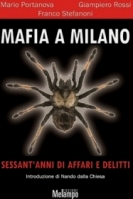Mario Portanova's Engaged Journalism
Mario Portanova, editor of Il Fatto Quotidiano.it, who graduated in Political Economy at Bocconi in 1994, had wanted to be a journalist since he was in secondary school. His first key steps were with Società Civile, the magazine headed by Nando dalla Chiesa, "who was my mentor at the time, and who was very exposed in the topics of organized crime that I was most interested in," then enrollment at University. "Bocconi in the late '80s meant certain employment, it was a compromise so my family would let me cultivate my dreams of becoming a journalist," explains Mario, "but political economy was also a complete study program, one of the few to combine aspects from the sciences and the humanities, a background that proved to be fundamental."
Mario Portanova's interests in the field of journalism took on a specific direction right away, which would color his entire career, including books and television: "Important government mysteries, terrorism, especially the mafia and its connections to politics. But I also worked on a lot of other things, first for various newspapers in the RCS group such as Il Mondo and Corriere Lavoro, then for the weekly publication Diario, where I worked from 2000 to 2007, leading a number of investigations."
The topics? The G8 in Genoa with its judicial implications, the no global movement, the war in Iraq. He writes with a journalistic style which is utilized less and less, conducted on the field, with first-person investigations, listening to people and seeing the facts with his own eyes. His inquests secured him a star status that led him to the third turning point in his career, in his own words, "after landing at RCS and Diario. It was my start in television, on the RAI network, with Blunotte led by Carlo Lucarelli, where I took care of the episodes on the Genoa G8, the mafia in Northern Italy and the asbestos disaster. Then there was a collaboration with Presa Diretta led by Riccardo Iacona, again for an episode on the mafia in Lombardy." He is high-quality and engaged journalist who still works in television and who works less often in newspapers, says Mario, "which too often follow only judiciary enquiries and rarely investigate before then. Before the 'Crimine infinito' operation in 2010 it was very difficult to get investigations on the mafia in Northern newspapers, and it was an underrated, almost irritating, topic."
 |
Yet the mafia in the North has existed for over fifty years, as Mario Portanova explains in Mafia a Milano: Sessant'anni di affari e delitti (Melampo Editore), written with Giampiero Rossi and Franco Stefanoni, "because in Milan, and in the North in general, the real mafia is here, especially the N'drangheta. They are the same mobsters as the ones in the original places, who intimidate and kill like the 'traditional' mafia, which has always existed. Then there are the white collars, entrepreneurs and realtors, who do business with them, but who are neighboring parties, and are not predominant." In addition to the most important phenomena, the disasters and homicides, the various mafia organizations are part of a gigantic apparatus with the aim of making money, with complex strategies and dynamics that require a specific background to be understood. And this is where his studies at Bocconi come to the rescue: "It was fundamental for me to have an economics background to understand the relations between criminal organizations and banks and their strategies and investments. But also to understand statistics, to better decipher the numbers and what's behind them, in addition to taking exams in law and sociology."
This is what Mario Portanova explains when he travels around Italy to book presentations where he has been invited, a recognition of a career which had an illustrious approval, as he describes: "I was a young student at Bocconi and passionate about journalism, and I decided to ask for advice about this profession from an economics professor who collaborated with Corriere della Sera. That professor was Mario Monti."